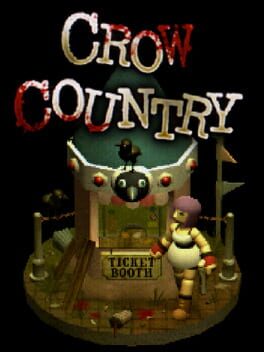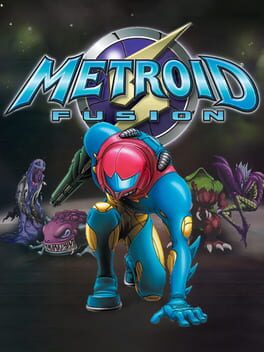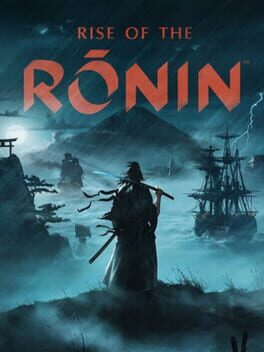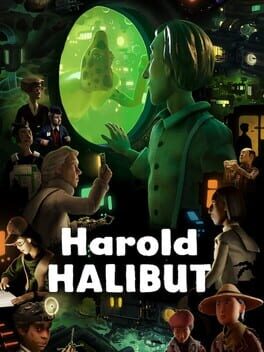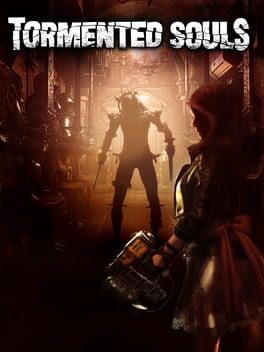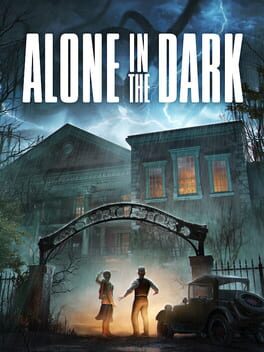sepia
103 reviews liked by sepia
Crow Country
2024
Crow Country wears its influences on its sleeve, lovingly embracing features and elements you’d expect to find in an entry in this genre, from tank controls to item-based puzzles. Unfortunately, its reverence for the games that inspired it (Resident Evil 1 &2, Silent Hill) can hold it back, as Crow Country never quite captures the same magic as the giants of the genre. But even with some of the proverbial rides at this theme park feeling like they could use some work, the game is still a comforting addition to the retro-horror trend.
Hi-Fi Rush
2023
Hi-Fi Rush
2023
Friends, loved ones, we gather here today to remember our good friend Hi-Fi Rush
The cliche saying "life comes at you fast" is apt to describe Hi-Fi Rush. It simultaneously announced and released at the end of what I would generously describe as a very mid Xbox game presentation in January 2023 to the delight of half-asleep gamers watching everywhere.
Hi-Fi Rush is rhythm-based character action game that had unique gameplay. It was forgiving to casual audiences so as to acclimate them to rhythm aspects of the game, but had aspects about it that made it the most hardcore character action game out there if you wanted it to be. If you wanted the highest ranking. If you wanted Chai to be holding a real guitar, you had to earn that shit in blood.
The game embraced a fun cast of characters. Embraced a saturday morning cartoon setting and story. It made Xenogears references when half-jokingly describing running out of budget for the last act of the game. It had licensed music from bands like Nine Inch Nails. Hi-Fi Rush was truly a hi-fi rush that made thousands of people think the game was tailor-made for them. Simply by being more in line with what people actually like. It was nice to see as such cases of personality and life being that it was rare to see such on a major publisher level.
Hi-Fi Rush was pushed out into the world to be loved, and to help boost a rapidly dying gaming platform, but actually mostly that first thing...
But mostly that second thing, actually.
The cancer of corporate consolidation and power, a time when optimal financialization is the only language those unrightfully holding the reigns of the industry speak. That is what killed a moderately successful game studio. Lack of passion or enthusiasm didn't kill Hi-Fi Rush. A financial officer running numbers and determining a sequel would make X amount of dollars less than a Call of Duty skin killed Hi-Fi Rush.
So as we lay them down to rest, we celebrate Hi-Fi Rush as it reminded gamers of a time when all games both big and small were released to be enjoyed unconditionally; with the upfront price tag of exceptional games were the beginning, middle and end of what was asked to own it.
Sadly, those days are snuffed out. You must now rent and subscribe to begin to be pumped with complicit, tedious gameplay trends that feel more diluted with every repackaging. Will we die with capitalism? Probably. Shit crazy out here, b.
Whether or not you cherished the life of Tango, or it's products like Evil Within or Hi-Fi Rush, you must understand that gaming on consoles is dead. Dead until the console platform holders release their own Steam Deck and it's probably going to be lame as fuck compared to a Steam Deck if your name is not Nintendo, but whatever.
Rest in peace, Hi-Fi Rush.
The cliche saying "life comes at you fast" is apt to describe Hi-Fi Rush. It simultaneously announced and released at the end of what I would generously describe as a very mid Xbox game presentation in January 2023 to the delight of half-asleep gamers watching everywhere.
Hi-Fi Rush is rhythm-based character action game that had unique gameplay. It was forgiving to casual audiences so as to acclimate them to rhythm aspects of the game, but had aspects about it that made it the most hardcore character action game out there if you wanted it to be. If you wanted the highest ranking. If you wanted Chai to be holding a real guitar, you had to earn that shit in blood.
The game embraced a fun cast of characters. Embraced a saturday morning cartoon setting and story. It made Xenogears references when half-jokingly describing running out of budget for the last act of the game. It had licensed music from bands like Nine Inch Nails. Hi-Fi Rush was truly a hi-fi rush that made thousands of people think the game was tailor-made for them. Simply by being more in line with what people actually like. It was nice to see as such cases of personality and life being that it was rare to see such on a major publisher level.
Hi-Fi Rush was pushed out into the world to be loved, and to help boost a rapidly dying gaming platform, but actually mostly that first thing...
But mostly that second thing, actually.
The cancer of corporate consolidation and power, a time when optimal financialization is the only language those unrightfully holding the reigns of the industry speak. That is what killed a moderately successful game studio. Lack of passion or enthusiasm didn't kill Hi-Fi Rush. A financial officer running numbers and determining a sequel would make X amount of dollars less than a Call of Duty skin killed Hi-Fi Rush.
So as we lay them down to rest, we celebrate Hi-Fi Rush as it reminded gamers of a time when all games both big and small were released to be enjoyed unconditionally; with the upfront price tag of exceptional games were the beginning, middle and end of what was asked to own it.
Sadly, those days are snuffed out. You must now rent and subscribe to begin to be pumped with complicit, tedious gameplay trends that feel more diluted with every repackaging. Will we die with capitalism? Probably. Shit crazy out here, b.
Whether or not you cherished the life of Tango, or it's products like Evil Within or Hi-Fi Rush, you must understand that gaming on consoles is dead. Dead until the console platform holders release their own Steam Deck and it's probably going to be lame as fuck compared to a Steam Deck if your name is not Nintendo, but whatever.
Rest in peace, Hi-Fi Rush.
Metroid Fusion
2002
I recently started the Metroid series from scratch for one reason: to play Metroid Fusion. I had always been intrigued by this game, thinking it looked a bit different from the rest of the series, but I just never had a chance to actually play it until recently. After finishing up Zero Mission, Samus Returns, and Super Metroid I was all ready to finally give this game a whirl.
Sadly, I did not enjoy Metroid Fusion. I don't feel it was a bad game, but in my opinion, it is the weakest game in there 2D series. My main issue with it was that it relied too heavily on the mechanic of blasting random walls to find the path forward. This mechanic has always been my least favorite aspect of the series, but at least in Samus Returns and Super Metroid you gained abilities that helped make things less obtuse (aeon scan in SR, X-Ray Visor in SM). I swear that half of my play time in Fusion was spent shooting/bombing random wall and floor tiles in hopes of finding the path forward. The mechanic really only exists to pad out the play time and I feel it is the game's biggest downfall.
Another issue I had with Fusion is that the "world" you explore is far less interesting than the ones in the previous games. In Fusion you find yourself in a science research station, which I liked the idea of, but felt that it lacked the mystery and intrigue of exploring a foreign planet. The different sectors of the research station varied from one another slightly, but they were nowhere near as varied as the areas found in other games in the series. (On a side note, this is supposed to be a research station where regular scientists work, right? But the areas are clearly designed to be maneuvered by someone with abilities akin to Samus... so am I to believe that scientists are space jumping around just to get to the breakroom?)
I also really disliked most of the bosses in Fusion. I will admit that they were more varied and interesting than most of the bosses from the earlier games, but I found their movement and attack patterns to be generally cheap and annoying (I'm looking at you, Nightmare). Each boss felt like more a test of endurance than skill as each boss required an absolute ton of damage to take them down, and each hit by them resulted in a huge loss of health to Samus. The save points for some of these bosses were placed infuriatingly far away too, which further added to my frustration. There were even a few times that I almost gave up on the game entirely because of these battles. I managed to get through them all in the end, but they were my least favorite boss battles in the entire series.
(One bonus complaint: after acquiring the final upgrade I was locked out of exploring the research station for some reason (you get locked in any Navigation room you enter, forcing you to progress to the final boss). I had planned on going back to get some missed upgrades before attempting the final boss, but I couldn't. Very strange game design for this style of game, if you ask me.)
Now that I have the negatives out of the way I suppose I should mention a few things I liked about the game. First, I really liked how much story there was in Fusion. Prior games in the series had just a few tidbits of a story here and there but Fusion's story is fully fleshed out and quite interesting. It ties in nicely to prior games in the series and also connects to the story in Metroid Dread too. The story was definitely Fusion's strongest aspect. Additionally, the game looked great. The sprite design was good and was well animated. The world design overall was less interesting than previous games, but it still looked fantastic.
Overall, I was quite disappointed by Metroid Fusion. The world was less interesting the previous entries in the series and exploring it was hampered immensely by the need to bomb/shoot hidden blocks just to progress with the story. I found the bosses to be the most annoying of the series, with a few of them almost making me give up on the game entirely. Fusion isn't necessarily a bad game, but I do consider it to be the worst game in this fantastic series.
Sadly, I did not enjoy Metroid Fusion. I don't feel it was a bad game, but in my opinion, it is the weakest game in there 2D series. My main issue with it was that it relied too heavily on the mechanic of blasting random walls to find the path forward. This mechanic has always been my least favorite aspect of the series, but at least in Samus Returns and Super Metroid you gained abilities that helped make things less obtuse (aeon scan in SR, X-Ray Visor in SM). I swear that half of my play time in Fusion was spent shooting/bombing random wall and floor tiles in hopes of finding the path forward. The mechanic really only exists to pad out the play time and I feel it is the game's biggest downfall.
Another issue I had with Fusion is that the "world" you explore is far less interesting than the ones in the previous games. In Fusion you find yourself in a science research station, which I liked the idea of, but felt that it lacked the mystery and intrigue of exploring a foreign planet. The different sectors of the research station varied from one another slightly, but they were nowhere near as varied as the areas found in other games in the series. (On a side note, this is supposed to be a research station where regular scientists work, right? But the areas are clearly designed to be maneuvered by someone with abilities akin to Samus... so am I to believe that scientists are space jumping around just to get to the breakroom?)
I also really disliked most of the bosses in Fusion. I will admit that they were more varied and interesting than most of the bosses from the earlier games, but I found their movement and attack patterns to be generally cheap and annoying (I'm looking at you, Nightmare). Each boss felt like more a test of endurance than skill as each boss required an absolute ton of damage to take them down, and each hit by them resulted in a huge loss of health to Samus. The save points for some of these bosses were placed infuriatingly far away too, which further added to my frustration. There were even a few times that I almost gave up on the game entirely because of these battles. I managed to get through them all in the end, but they were my least favorite boss battles in the entire series.
(One bonus complaint: after acquiring the final upgrade I was locked out of exploring the research station for some reason (you get locked in any Navigation room you enter, forcing you to progress to the final boss). I had planned on going back to get some missed upgrades before attempting the final boss, but I couldn't. Very strange game design for this style of game, if you ask me.)
Now that I have the negatives out of the way I suppose I should mention a few things I liked about the game. First, I really liked how much story there was in Fusion. Prior games in the series had just a few tidbits of a story here and there but Fusion's story is fully fleshed out and quite interesting. It ties in nicely to prior games in the series and also connects to the story in Metroid Dread too. The story was definitely Fusion's strongest aspect. Additionally, the game looked great. The sprite design was good and was well animated. The world design overall was less interesting than previous games, but it still looked fantastic.
Overall, I was quite disappointed by Metroid Fusion. The world was less interesting the previous entries in the series and exploring it was hampered immensely by the need to bomb/shoot hidden blocks just to progress with the story. I found the bosses to be the most annoying of the series, with a few of them almost making me give up on the game entirely. Fusion isn't necessarily a bad game, but I do consider it to be the worst game in this fantastic series.
Drakengard
2003
Rise of the Ronin
2024
Take a tried and true formula and force the standardized Ubisoftian Open World and Side quests, and you get a worse experience than playing through the previous Team Ninja games. The combat is lifted straight from Wo Long with the added movesets from Nioh and other Team Ninja games.
I entered a flow state in the beginning, clearing quest, doing all the side content like gambling and bounty hunting, raising my bonds and going on murder dates with the husbandos was cool. This was when the game was at its best, and I wish it dug more into these without them being and feeling like busywork.
Just like unironically a lot of Sony's open world games, by the time you finish the bajillion map markers for bonus rewards, you get another map full of the same shit to do once again. The relationship system gets tiresome when they all have these boring linear corridor missions. It's honestly overwhelming. You start getting introduced to 3-4 new characters at a time, each with their own sets of missions and affection towards other characters. Though tangible rewards are tied to each of these bonds like skill points and move set upgrades.
I was fatigued by the time I reached the second chapter, and just beelined the story after getting annoyed with the photography missions. This game makes me appreciate the linearity of Nioh missions over this lifeless open world.
My heart tells me to give this game a 2/5 instead, but in the honeymoon phase, I really enjoyed this game. If this is your dig, then you have A LOT to do, whereas I could give less of a shit about these characters and overall story due to its genericness (is that a word?)
I entered a flow state in the beginning, clearing quest, doing all the side content like gambling and bounty hunting, raising my bonds and going on murder dates with the husbandos was cool. This was when the game was at its best, and I wish it dug more into these without them being and feeling like busywork.
Just like unironically a lot of Sony's open world games, by the time you finish the bajillion map markers for bonus rewards, you get another map full of the same shit to do once again. The relationship system gets tiresome when they all have these boring linear corridor missions. It's honestly overwhelming. You start getting introduced to 3-4 new characters at a time, each with their own sets of missions and affection towards other characters. Though tangible rewards are tied to each of these bonds like skill points and move set upgrades.
I was fatigued by the time I reached the second chapter, and just beelined the story after getting annoyed with the photography missions. This game makes me appreciate the linearity of Nioh missions over this lifeless open world.
My heart tells me to give this game a 2/5 instead, but in the honeymoon phase, I really enjoyed this game. If this is your dig, then you have A LOT to do, whereas I could give less of a shit about these characters and overall story due to its genericness (is that a word?)
Harold Halibut
2024
Tormented Souls
2021
It’s fair to say a good portion of the survival horror fandom still yearn for the halcyon days of fixed-camera classics - I don’t need to mention which ones. And there’s plenty of recent homages to just that: Song of Horror, Alisa, Murder House, Dawn of Fear, The Medium, Post Trauma, etc. Tormented Souls, with a story as generic as its title, is neither the best nor worst of them.
In its favour, the fixed camera gameplay and combat are pretty solid, appropriately challenging in moments of confinement with a monstrosity trying to tear you up. My hottest take is that Tormented Souls boasts some of the strongest puzzles we’ve seen in horror gaming for a long time: some puzzles are the standard ‘find a thing that wouldn’t normally combine with this other thing but somehow combines anyway and does something cool’ type thing and others involve hopping into alternate mirror dimensions and even a bit of time travel to alter the state of the real world. The sound design is also rather accomplished, evoking the oppressive soundscapes of the first Silent Hill game. The score is good and, while not always perfect, can be unsettling - the music that plays when the ‘stalker’ monster is near had me spinning around and immediately running back.
My only gripe, beyond the voice acting that leaves a lot to be desired, is the aesthetic coherence: while I appreciated the cluttered ‘lived-in’ design of the setting, it’s sort of ugly? Maybe this is just my personal preference as a purist for Silent Hill’s stripped back design where emptiness creates ambiguity and unease, but this place leans into the curious over-design of a steampunk fantasy world. Or is it just me? In other words, this game, which somehow gets away with placing some of the all-time classic disturbing paintings (The Nightmare, Judith Beheading Holofernes, etc) in its world, does not manage to conjure any unique visceral horror of its own.
Lots of strong elements but there’s certainly room for improvement. And if there’s any lesson Tormented Souls’ upcoming sequel should learn, it’s that homage can only get you so far.
In its favour, the fixed camera gameplay and combat are pretty solid, appropriately challenging in moments of confinement with a monstrosity trying to tear you up. My hottest take is that Tormented Souls boasts some of the strongest puzzles we’ve seen in horror gaming for a long time: some puzzles are the standard ‘find a thing that wouldn’t normally combine with this other thing but somehow combines anyway and does something cool’ type thing and others involve hopping into alternate mirror dimensions and even a bit of time travel to alter the state of the real world. The sound design is also rather accomplished, evoking the oppressive soundscapes of the first Silent Hill game. The score is good and, while not always perfect, can be unsettling - the music that plays when the ‘stalker’ monster is near had me spinning around and immediately running back.
My only gripe, beyond the voice acting that leaves a lot to be desired, is the aesthetic coherence: while I appreciated the cluttered ‘lived-in’ design of the setting, it’s sort of ugly? Maybe this is just my personal preference as a purist for Silent Hill’s stripped back design where emptiness creates ambiguity and unease, but this place leans into the curious over-design of a steampunk fantasy world. Or is it just me? In other words, this game, which somehow gets away with placing some of the all-time classic disturbing paintings (The Nightmare, Judith Beheading Holofernes, etc) in its world, does not manage to conjure any unique visceral horror of its own.
Lots of strong elements but there’s certainly room for improvement. And if there’s any lesson Tormented Souls’ upcoming sequel should learn, it’s that homage can only get you so far.
Inscryption
2021
Alone in the Dark
2024
Man, can you believe these guys put out one of the worst demos of all time. Straight up, named it after Jack in the Dark, an amazing preview of AitD2, and then had it be a 10 minute long walking sim where you do nothing but look at things. Made me think the main game would be complete trash.
I HAVE NOT HAD THIS MUCH GENUINE FUN SOLVING PUZZLES IN A HORROR GAME SINCE SILENT HILL 3
I HAVE NOT HAD THIS MUCH GENUINE FUN SOLVING PUZZLES IN A HORROR GAME SINCE SILENT HILL 3
